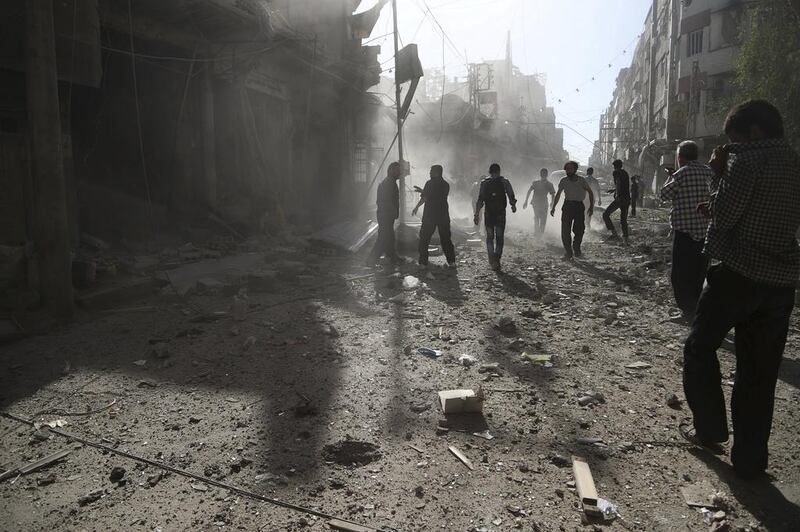Tuesday marks the first anniversary of the American-led air strikes against ISIL targets inside Syria. For the most part, the campaign in Syria was designed to be secondary to the main fight in Iraq, by targeting ISIL's financial and logistical routes on the northern front. A week into the campaign, the Pentagon announced that 16 out of 20 ISIL-controlled oil refineries had been destroyed and air strikes would move to blunt the group's ability to conduct combat in Iraq.
A year later, the campaign can be credited for two main successes. The first one was the protection of the Kurdish town of Kobani from falling to ISIL’s advancing forces, even though the group’s offensive lasted for more than four months under aerial bombardment and ground forces. The second main success was clean: in July, Kurdish forces swept through the border town of Tal Abyad with the coalition’s assistance.
Elsewhere, however, ISIL made more gains than before the campaign started. In May, it drove the Assad regime's forces from the city of Palmyra, in central Syria. The seizure of Palmyra has allowed the group to push further towards Homs and southern Syria through the lawless and neglected desert – an environment that favours ISIL in terms of buying loyalties and establishing safe bases. It also advanced in the countryside around Hama, Homs, Aleppo, Deraa and Damascus.
Aside from the military situation, special consideration must be given to how the targeting of ISIL’s financial routes is affecting local attitudes towards the group. In recent months I have noticed a trend of some families sending at least one of their children to join ISIL because that was the only way for them to generate an income in the family. This is especially the case among displaced families, although not limited to them.
A family of eight, for example, left the city of Deir Ezzor due to shelling and bombardment and lived in an ISIL-controlled town in the countryside. The family’s breadwinner could not find a job to sustain his family of four daughters and two sons, including one disabled son. Eventually the father sent one of his sons to join ISIL which paid a monthly salary of $400 (Dh1,469). The son was since displaced to fight for the group in Hasakah.
Another case is of a family from Hatla, near Deir Ezzor, who were displaced to a town called Subaykhan. The family’s breadwinner, their 21-year-old son, joined ISIL to support a family of five. The man, who has only visited his family once since he joined the group five months ago, was sent to fight in the Iraqi town of Haditha.
Such situations are widespread and are a direct result of the air campaign. Many of those families would not have allowed their children to join ISIL. Suspicion towards the group was common before the campaign and many families had successfully persuaded their children to leave the extremists behind. In such cases, ISIL would allow the member to choose whether he wanted to return to his family instead of fighting for it.
Officials involved in the international coalition recognise the negative financial effect of the campaign and the lack of an alternative to the poor people living under ISIL. Many even hope that the worsening situation would lead people to rise up against the group or cooperate with foreign countries fighting it. But that is an absurd thought disproved by overwhelming examples of people getting closer to the organisation – out of need more than anything else – because of the air strikes.
The air strikes disrupted a functioning war economy that predated ISIL. After the collapse of the Syrian state in much of the country, people relied on local resources to stay alive. In eastern Syria, cheap oil allowed farmers to operate engines to pump water from the Euphrates river to irrigate farm lands. Poorly-refined oil would also be used to operate heavy vehicles for transport and agricultural uses. Whole families and even armed groups worked in primitive refineries or protection of oil tankers. The oil-related businesses revitalised local markets and helped ensure basic needs such as electricity and water.
When ISIL controlled those areas, it managed the resources and profited from them but it did not monopolise the war economy. Families continued to work in oil, even though ISIL capped profitability and prices. When the air strikes began, the campaign disrupted the livelihood of hundreds of families directly working in oil and many others who indirectly benefited from the industry.
The air strikes did not stop there. They have also targeted bridges that link urban centres to adjacent villages, which made life for people much harder. Locals now use boats to move from one place to another and a trip that took half an hour now takes at least two hours.
Thousands in eastern Syria rely on remittances sent by family members working in the Gulf. Others now work only to provide bread and basic needs for their families. People also report that some families struggle to provide enough food for their children, a development previously unheard of in the region.
The situation has become much worse as the campaign has intensified over the months. One can hardly blame parents who find themselves forced to send one or more of their children either to Europe, despite the risks, or to ISIL.
Such a dilemma is just another example of the sheer disconnect of the campaign to degrade and destroy ISIL. Except for the meagre military achievement over the past year, the campaign seems to be only degrading and destroying the livelihoods of the poor families living under ISIL.
Hassan Hassan is associate fellow at Chatham House’s Middle East and South Africa Programme, a non-resident fellow at the Tahrir Institute for Middle East Policy and co-author of ISIS: Inside the Army of Terror
On Twitter: @hxhassan





